The Misreporting of Japanese Sex Statistics
You’ve probably heard about Japan’s ‘sexlessness epidemic’. It is often linked to their fertility crisis, and with the rise of so-called ‘herbivore men’ who avoid the trouble of courtship in favour of 2D waifus. It is also perceived by many to be a canary in the coal mine, signalling what may be in store for Western countries (although they’re already not far behind when it comes to birth rates). It’s a topic that has attracted a good deal of interest from Western media. For instance, results of a 2015 Japanese survey spurred a barrage of sensational media coverage:
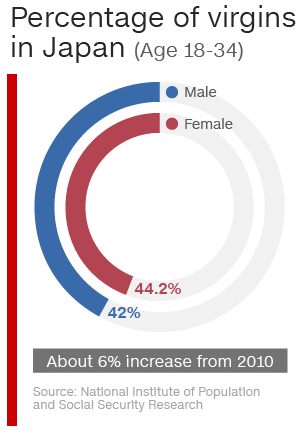

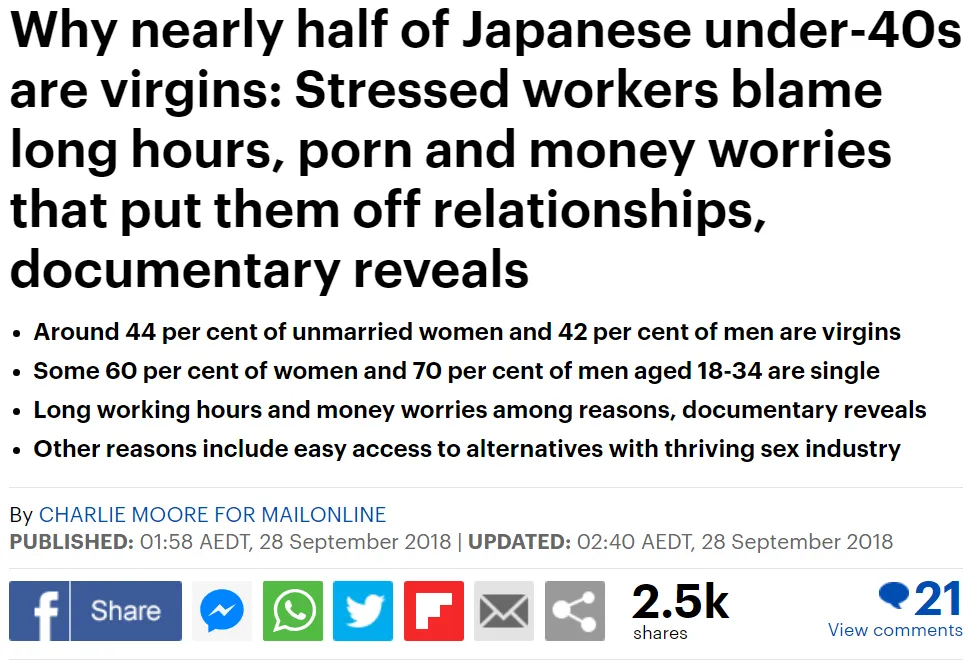
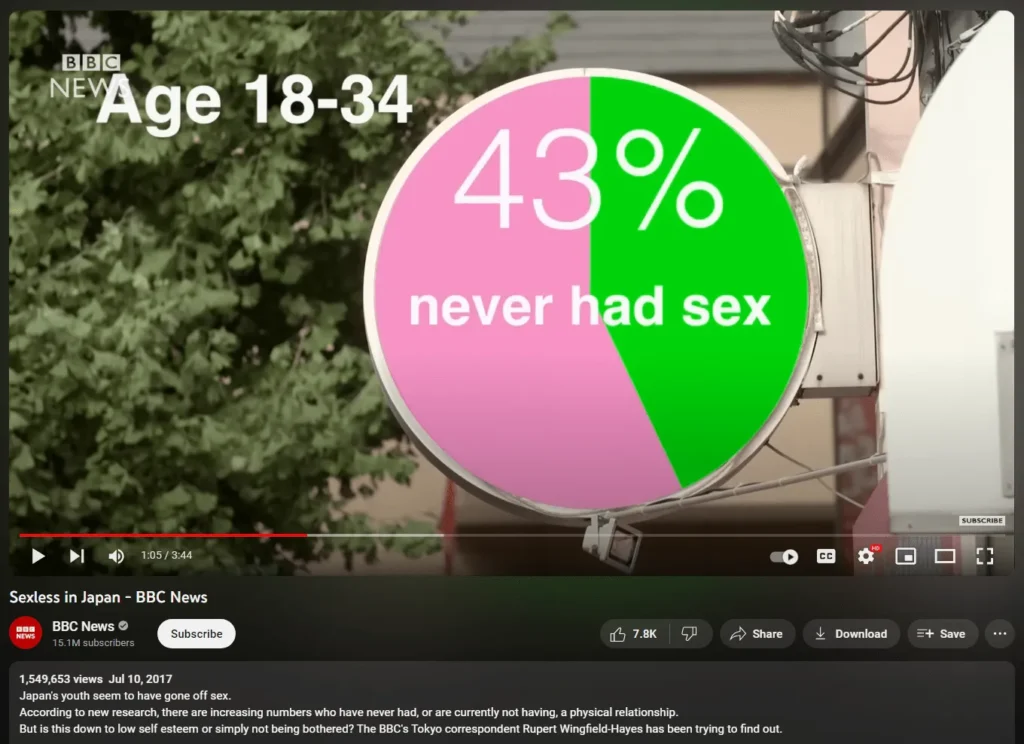
It was also cited in a recent Financial Times piece on incels:

So are almost half of Japanese people between the ages of 18-34 really virgins? To put this into perspective, a large nationally representative US dataset named the National Survey of Family Growth has the figure at 11% in the 2017-19 survey cycle. While there are no doubt cultural differences to consider and the US probably has some catching up to do, a rate four times as high doesn’t pass my sniff test.
What’s Going On?
Let’s go to the original source, a nationally representative survey named the National Fertility Survey of Japan, to try and get to the bottom of this. Here is a table from it including the previously mentioned figures:
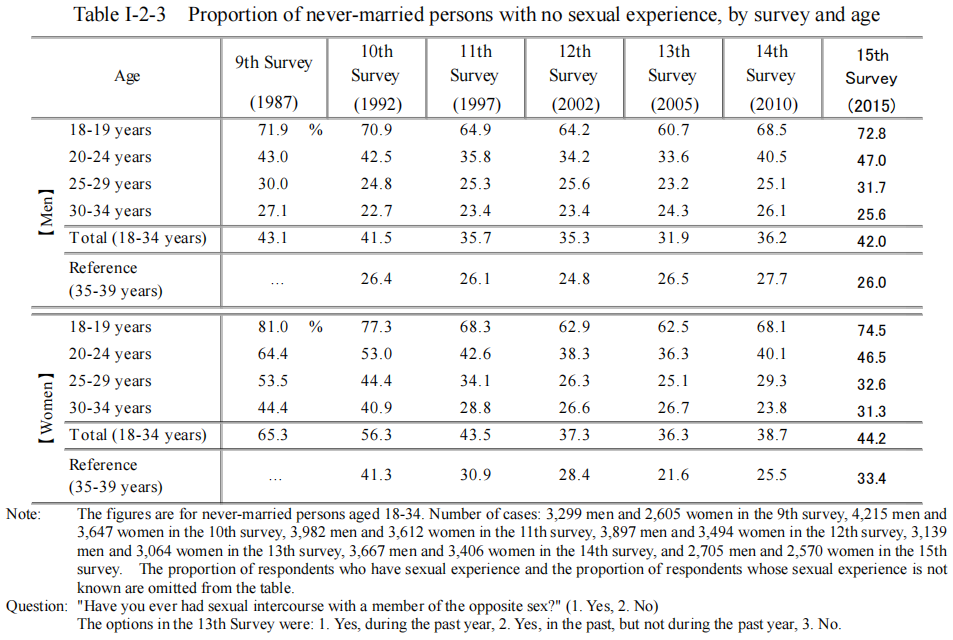
You’ll notice that at the top it specifies ‘never-married persons’. These proportions are not referring to all 18-34 year old men and women. If we were to take these figures as referring to men and women more broadly, we’d have to conclude that one third of 35-39 women were virgins, a proportion somehow only slightly lower than the 18-34 group. This is a pretty big oversight. Clearly including people who had married would lower the overall rate, as nearly all of them will have had sex. It seems like someone may have misinterpreted this data (or deliberately misreported it for clicks) and then the rest played follow the leader.
Ghaznavi et al., 2019, analyzed data from the same source. It found that overall, including both married and never married people, about 1/4th of 18-39 men and women were (heterosexual) virgins. This age range is a little wider so the rate will be somewhat higher for 18-34s, maybe about 30%, but it’s also worth bearing in mind this pertained to heterosexual sex only. As you can see, the overall rates are indeed a lot lower than the rate for never married people when it comes to the respondents in the older age groups:
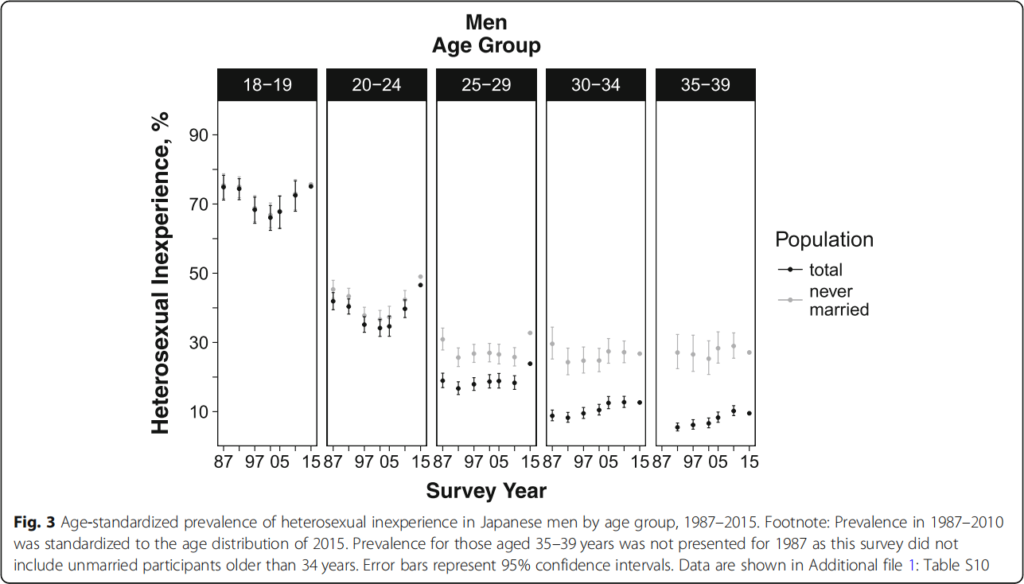
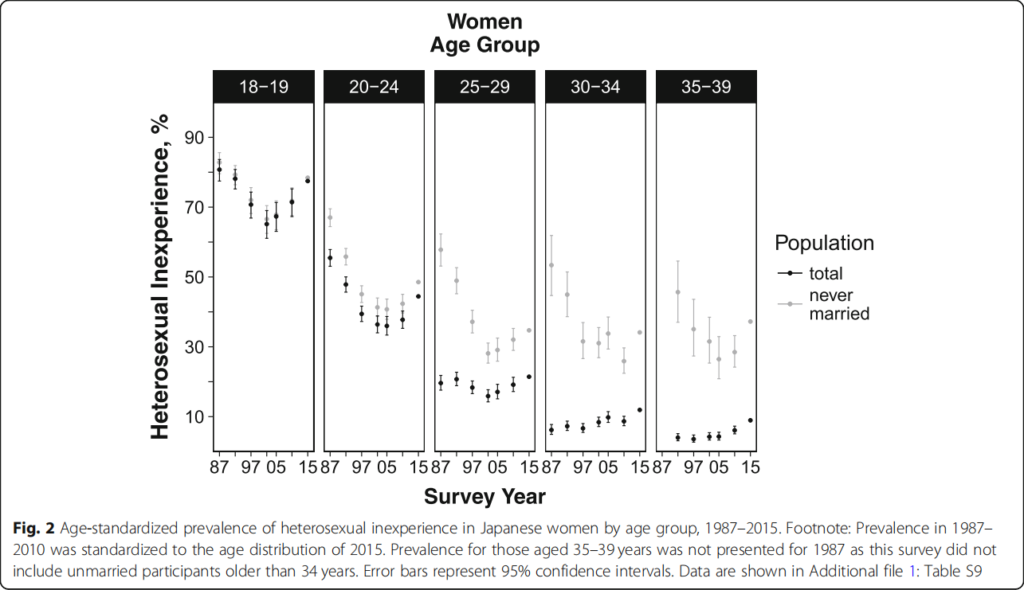
We also see that for the younger respondents, sexlessness rates have not risen to completely unprecedented levels, but to a similar point they were at between 1987-97. After a brief dip in sexual inexperience, it rose for 18-19 women from 65.1% in 2002 to 77.5% in 2015, and for 20-24 women from 36% to 44.4%.
For 30-34 women it rose from 6.2% in 1987 to 11.9% in 2015, though this trend wasn’t statistically significant. For 35-39 women it rose from 4% to 8.9%. For men, after a similar dip, the rate of sexual inexperience rose for 18-19s from 66.1% in 2002 to 75.1% in 2015, and for 20-24s from 34.2% to 46.6%. Though the rates rose for men in their 30s, the trend wasn’t statistically significant.
They also found that unemployment, temporary/part-time employment, and low income were associated with heterosexual inexperience among men. An opposite trend however was found for women whereby unemployment and low income was associated with a lower likelihood of sexual inexperience. Women also had higher rates of sexual inexperience the more educated they were, while this wasn’t the case for men.
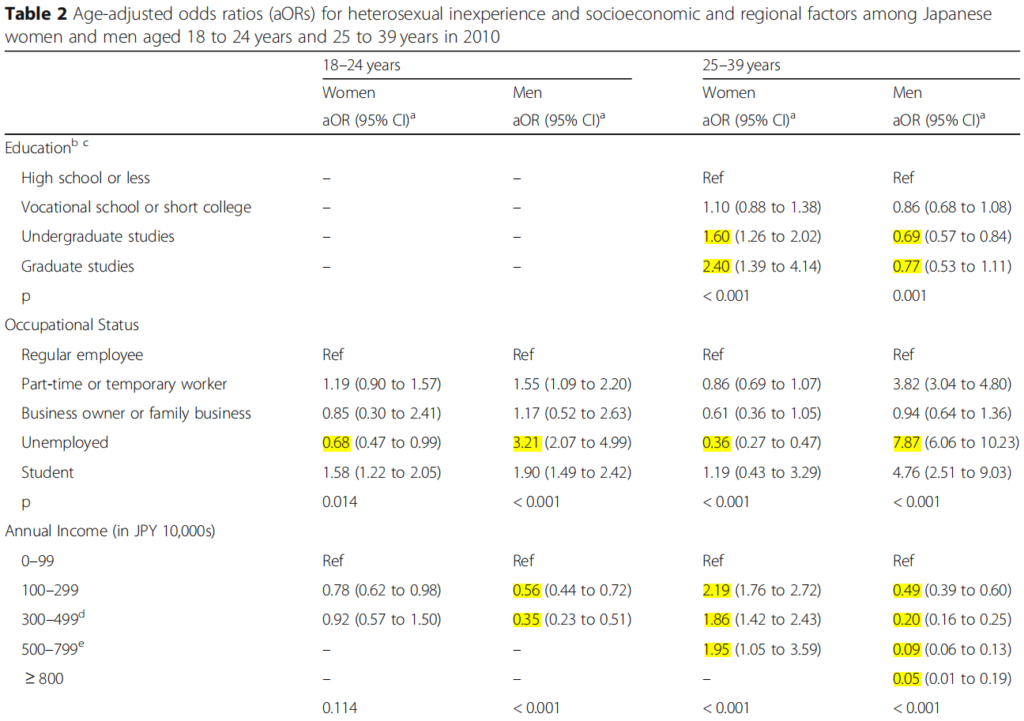
It seems therefore reasonable to assume that hypergamy (in the original non-memeified sense of the word) may play a significant role, and the persistence traditional gender norms dictate that socioeconomic status remains a vital component of Japanese men’s success in the mating market. MGTOWs and WGTOWs probably don’t play too large a role as 78.2% of men and 81% of women and aged 25-39 who had no heterosexual experience desired to be married in their lifetimes.
Another example of incredible journalism came in the form of the headline ‘One in 10 Japanese men are 40-year-old virgins, study finds’:
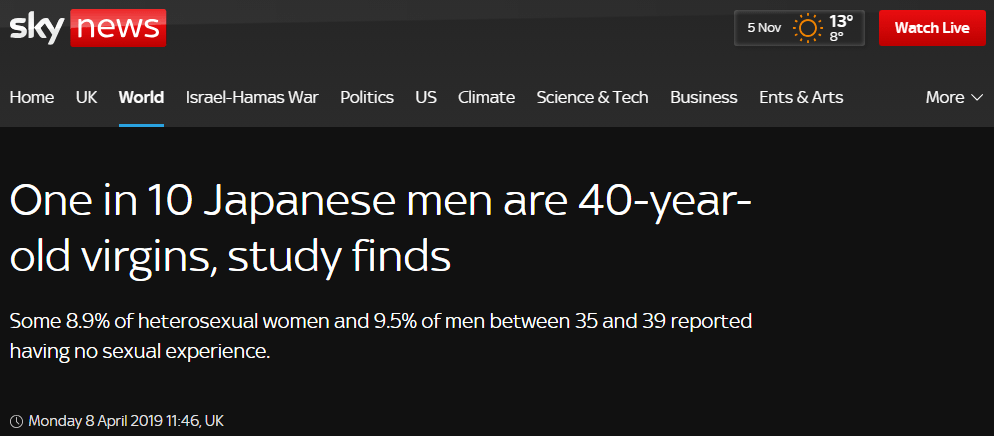
This one is even worse:

But ignoring the fact that this statement is absurd if taken literally due to its poor phrasing (and jumping from 35-39 to 40, though it probably doesn’t make too much difference), an important caveat that the study made sure to mention is that these percentages pertain strictly to heterosexual sex. Since the sample wasn’t limited to heterosexuals, if you included same-sex intercourse the rate would definitely be lower, maybe 1 in 20.
The Latest Stat
Another statistic has since made the rounds. Here we see the same exact mistake being made, this time based on data from The White Paper on Gender Equality 2022:
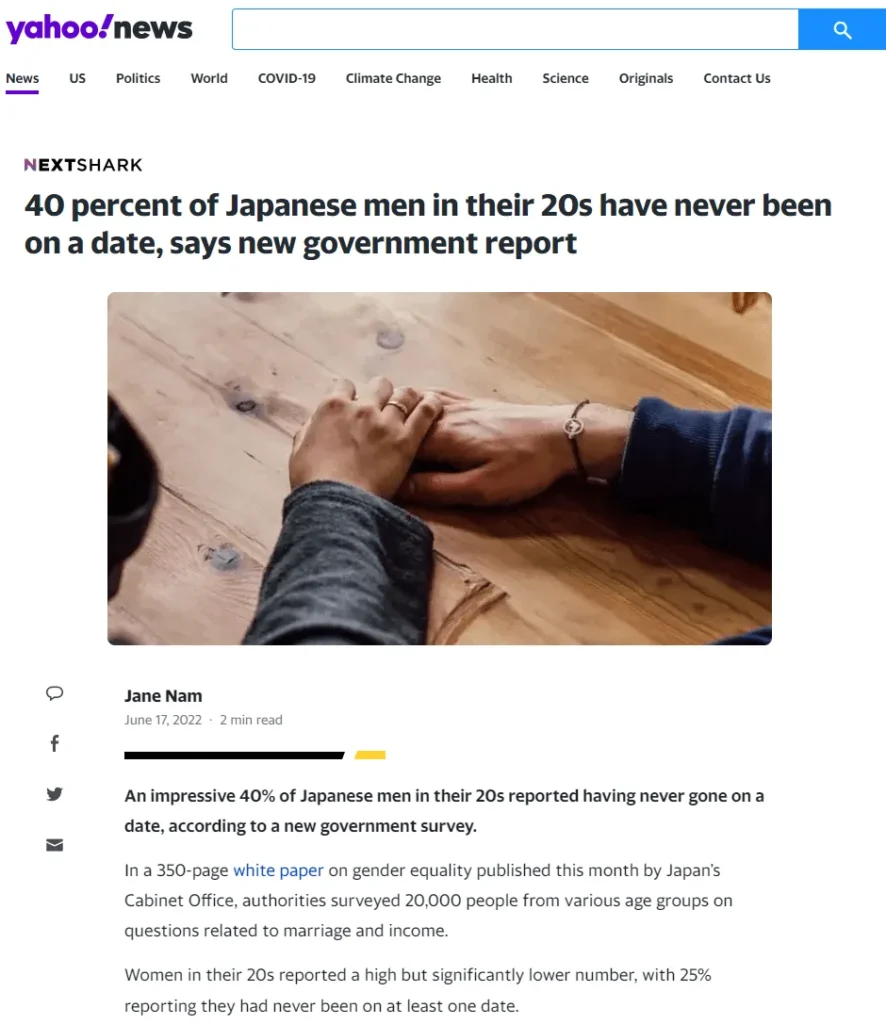
‘Japanese men’, huh? Sure you’re not leaving out any important details? These were the rates for older age groups:
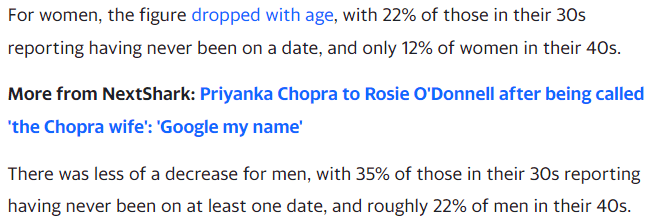
Just on its surface, does it seem plausible that the percentage of women who hadn’t dated before dropped by only 3% from 25% to 22% going from their 20s to their 30s, and from 40% to 35% for men? I would say no. There are plenty of people in their early-mid 20s who still have time to figure things out. The average age of first marriage in Japan is around 30, so it seems bizarre to think that the vast majority of people in their 20s who haven’t dated before will not have dated 10 years down the line. When we track down the original source, we see this 40% rate on the right for men, but we also see a dashed line beneath at a much lower point.


If we run ‘独身’ through google translate, we get ‘single’, and ‘既婚’ translates to ‘married’. You can probably figure out which is which. It might seem strange that some married people hadn’t dated before, but I believe they were asked how many they’d had between graduating high school and their first marriage. Since 65.8% of men in their 20s and 35.5% of men in their 30s reported being single, the rates of 40% and 35% would translate to 26.3% of men in their 20s and 12.4% of men in their 30s overall having not dated before. We can assume the primary reason the rate was higher for men is that women tend to date up in age. It’s of course possible that some of it is attributable to women ‘sharing’ the same guys in a sequential fashion, but it’s hard to tell exactly from the distributions.
The Latest Data
We can also look at the 2021 survey by the National Fertility Survey of Japan to find out if this trend continued. These are the rates of unmarried men and women who’d had sex before:
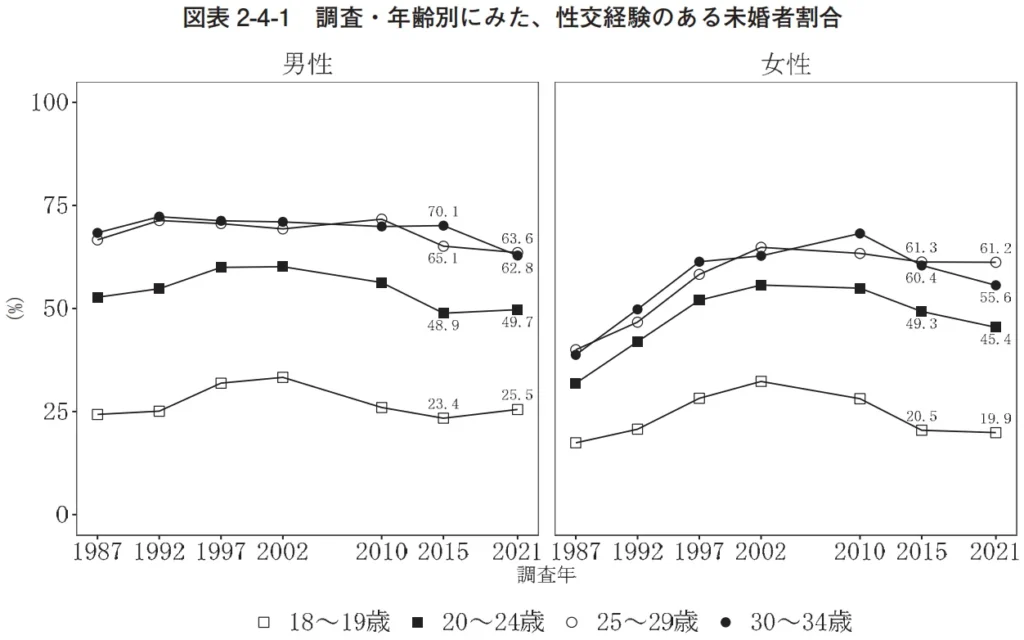
Interestingly, it seems like the rate for men has basically flatlined, with the exception of 30-34 men who experienced a decline, which would make sense considering the earlier drops seen in the younger cohorts. For women, the 20-24 group also apparently experienced a slight decline. Of course it’s also possible that there has been a further reduction in marriage rates which would mean that the overall rate will have still dropped, but I couldn’t seem to find info on this.
Anyway, if you needed another reason why you shouldn’t trust the lazy click-driven media at its word, there you go. I mean it is still pretty high to be fair, the exaggeration doesn’t seem necessary.
References
Jozuka, E. & Ripley, W. “Why are almost half of Japan’s millennials still virgins?”. CNN. https://edition.cnn.com/2016/09/20/asia/japanese-millennials-virgins/index.html
Moore, C. (2018). “Why nearly half of Japanese under-40s are virgins: Stressed workers blame long hours, porn and money worries that put them off relationships, documentary reveals”. Daily Mail. https://www.dailymail.co.uk/news/article-6215263/Why-nearly-half-Japanese-40s-virgins.html
BBC News (2017). “Sexless in Japan – BBC News”. https://www.youtube.com/watch?v=dHePoMNeWo8
Kuper, S. (2023). “We should pity (some of) the incels”. The Financial Times. https://www.ft.com/content/4ab260b5-ce0b-4636-a819-4b10190290cb
National Institute of Population and Social Security Research (2017). The Fifteenth Japanese National Fertility Survey in 2015. https://www.ipss.go.jp/ps-doukou/e/doukou15/Nfs15R_summary_eng.pdf
Ghaznavi, C., Sakamoto, H., Yoneoka, D., Nomura, S., Shibuya, K., & Ueda, P. (2019). Trends in heterosexual inexperience among young adults in Japan: analysis of national surveys, 1987-2015. BMC public health, 19(1), 355. https://doi.org/10.1186/s12889-019-6677-5
Demetriou, D. (2015). Rise of Japan’s middle-aged virgins: a quarter of over-30s have never had sex. The Telegraph. https://www.telegraph.co.uk/news/worldnews/asia/japan/11662500/Rise-of-Japans-middle-aged-virgins-a-quarter-of-over-30s-have-never-had-sex.html
Sky news (2019). “One in 10 Japanese men are 40-year-old virgins, study finds”. https://news.sky.com/story/one-in-10-japanese-men-are-40-year-old-virgins-study-finds-11687594
Nam, J. (2022). “40 percent of Japanese men in their 20s have never been on a date, says new government report”. https://news.yahoo.com/40-percent-japanese-men-20s-210055668.html
Gender Equality Bureau Cabinet Office (2022). The White Paper on Gender Equality 2022. https://www.gender.go.jp/about_danjo/whitepaper/r04/zentai/pdf/r04_print.pdf
National Institute of Population and Social Security Research (2023). Marriage and Childbirth in Japan Today: The Sixteenth Japanese National Fertility Survey, 2021. https://www.ipss.go.jp/ps-doukou/j/doukou16/JNFS16_ReportALL.pdf
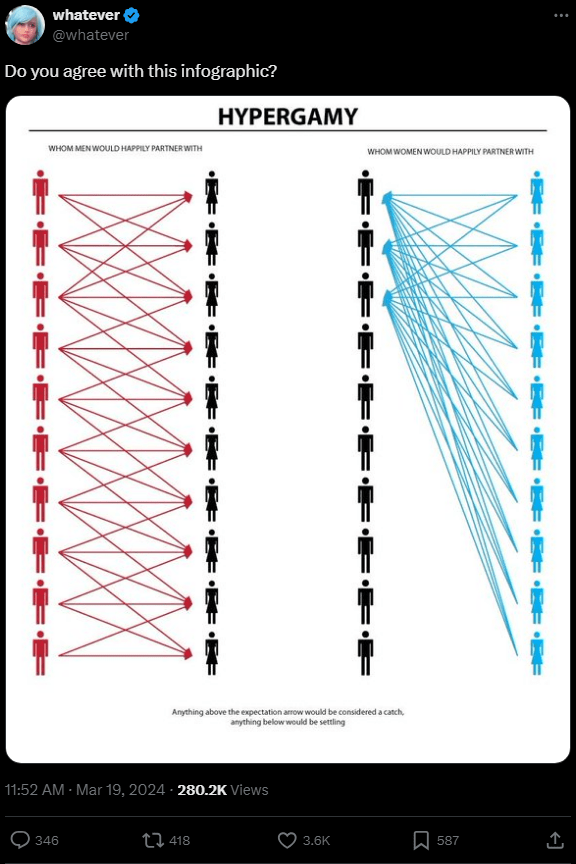

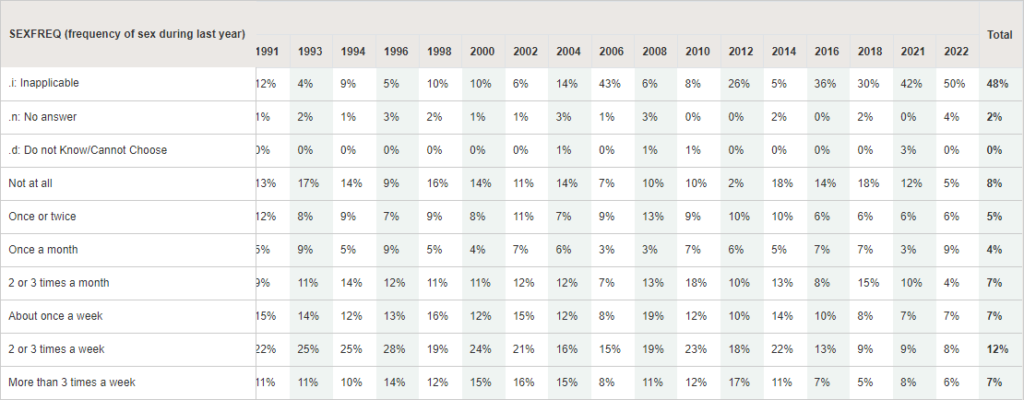
I enjoyed it just as much as you will be able to accomplish here. You should be apprehensive about providing the following, but the sketch is lovely and the writing is stylish; yet, you should definitely return back as you will be doing this walk so frequently.
What i do not understood is in truth how you are not actually a lot more smartlyliked than you may be now You are very intelligent You realize therefore significantly in the case of this topic produced me individually imagine it from numerous numerous angles Its like men and women dont seem to be fascinated until it is one thing to do with Woman gaga Your own stuffs nice All the time care for it up
I loved as much as you will receive carried out right here The sketch is tasteful your authored subject matter stylish nonetheless you command get got an edginess over that you wish be delivering the following unwell unquestionably come further formerly again as exactly the same nearly very often inside case you shield this hike
Optimize Your Farm’s Water Management with Bwer Pipes: Bwer Pipes offers a comprehensive range of irrigation solutions designed to help Iraqi farmers maximize water efficiency. Our reliable sprinkler systems and durable pipes ensure uniform water distribution, promoting healthier crops and sustainable farming practices. Explore Bwer Pipes
Temp mail Hi there to all, for the reason that I am genuinely keen of reading this website’s post to be updated on a regular basis. It carries pleasant stuff.
Vitazen Keto Gummies I’m often to blogging and i really appreciate your content. The article has actually peaks my interest. I’m going to bookmark your web site and maintain checking for brand spanking new information.
Program iz There is definately a lot to find out about this subject. I like all the points you made
Program iz There is definately a lot to find out about this subject. I like all the points you made
Real Estate I very delighted to find this internet site on bing, just what I was searching for as well saved to fav
Simply Sseven I’m often to blogging and i really appreciate your content. The article has actually peaks my interest. I’m going to bookmark your web site and maintain checking for brand spanking new information.
With your post, your readers, particularly those beginners who are trying to explore this field won’t leave your page empty-handed. Here is mine at ZQ3 I am sure you’ll gain some useful information about Airport Transfer too.
Pink Withney This is my first time pay a quick visit at here and i am really happy to read everthing at one place